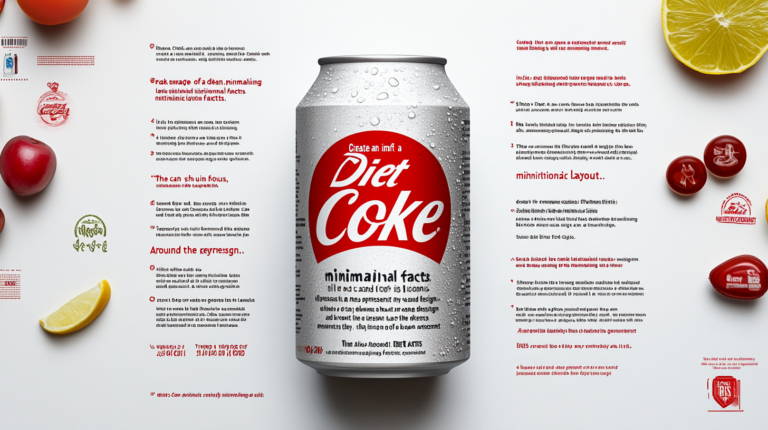Calories: The Virtually Zero-Calorie Beverage
One of the most attractive qualities of Diet Coke is its calorie count, or lack thereof. A typical 12-ounce can contains less than one calorie, making it nearly “calorie-free” by FDA standards. This minimal caloric presence is a major reason why it’s so popular among those looking to cut calories without sacrificing flavor.
Sodium Content: The Salty Side of diet coke nutrition facts
Although Diet Coke is marketed as a sugar-free beverage, it does contain sodium. A 12-ounce serving has approximately 40 milligrams of sodium. While this may seem minimal, it can contribute to daily sodium intake for those monitoring their salt levels. Sodium is added to enhance flavor and preserve freshness, but it’s important to consider its cumulative effect.
Artificial Sweeteners: The Role of Aspartame
Aspartame is the primary artificial sweetener in Diet Coke, providing sweetness without sugar. Aspartame is nearly 200 times sweeter than sucrose (table sugar), allowing for intense sweetness with negligible calories. Aspartame has been rigorously tested for safety, but debates continue about its effects on health, making it a central topic in Diet Coke discussions.
Caffeine Content: A Mild Energy Boost
Diet Coke contains about 46 milligrams of caffeine per 12-ounce can. While not as high as coffee, this amount provides a moderate energy boost, making it a popular pick-me-up. For those sensitive to caffeine, Diet Coke also offers a caffeine-free version, appealing to consumers who want the flavor without the stimulant.
Acidity Levels: Diet Coke’s pH and Potential Effects on Teeth
Diet Coke has a low pH level, generally around 3.2, making it quite acidic. This acidity, primarily from phosphoric and citric acids, can potentially erode enamel over time. While the acidity level enhances the drink’s tanginess and preserves freshness, dental health professionals often caution against frequent consumption.
Phosphoric Acid: Why It’s Added and Its Impact on Health
Phosphoric acid is included in Diet Coke to provide a sharp flavor and balance sweetness. However, high intake of phosphoric acid over time has been linked to bone density issues, as it can potentially interfere with calcium absorption. Regular drinkers of Diet Coke may want to be mindful of their phosphorus intake from other sources as well.
Potassium Benzoate: A Key Preservative in Diet Coke
To maintain shelf life and prevent bacterial growth, potassium benzoate is used in Diet Coke. While generally recognized as safe, potassium benzoate can form benzene, a known carcinogen, when combined with certain conditions. This potential risk is minimal in regulated conditions, but it’s an ingredient that often piques consumer curiosity.diet coke nutrition facts
Citric Acid: Enhancing Flavor and Preserving Freshness
Citric acid adds a refreshing, tart taste to Diet Coke, complementing its sweetness while acting as a natural preservative. Known for its antioxidant properties, citric acid is widely used in beverages. In Diet Coke, it creates a crisp taste profile but also contributes to the overall acidity.
Carbonation: The Fizzy Factor
Carbonation is essential to the Diet Coke experience, providing the familiar effervescence that many soda enthusiasts crave. Carbon dioxide is added under pressure, creating bubbles that give the drink its refreshing sensation. While carbonation itself is harmless, it may lead to bloating or stomach discomfort in sensitive individuals.
Coloring Agents: The Use of Caramel Color
Diet Coke owes its classic cola appearance to caramel color, a common food-grade coloring. Caramel color adds a rich, brown hue to beverages. Some consumers have concerns about caramel color due to compounds called 4-MEI that may form during its production, although regulatory bodies consider it safe at controlled levels.
Is Diet Coke Hydrating?
While Diet Coke is primarily water-based, it isn’t as hydrating as plain water due to caffeine and other additives. Caffeine acts as a mild diuretic, potentially leading to increased urination. For those relying on it as a primary hydration source, supplementing with plain water is recommended.
The Zero-Sugar Appeal: How Diet Coke Fits Into Low-Carb Diets
Diet Coke has long been embraced by low-carb dieters for its zero-sugar formulation. With no carbs or sugar to impact blood glucose, it’s considered keto-friendly and suitable for those aiming to reduce sugar intake. However, moderation is key as artificial sweeteners can still impact insulin sensitivity in some cases.
Potential Health Concerns of Regular Diet Coke Consumption
Concerns surrounding Diet Coke often revolve around artificial sweeteners, acid content, and potential links to metabolic changes. Some studies suggest that frequent consumption of artificially sweetened drinks may influence appetite regulation, but evidence remains mixed. As with any dietary choice, moderation plays a key role.
Popular Myths About Diet Coke Nutrition Debunked
From rumors that Diet Coke causes weight gain to claims that it’s highly addictive, many myths surround Diet Coke. Here, we debunk common misconceptions and explore the research behind these claims, providing clarity on what’s true and what’s exaggerated.
Conclusion: Is Diet Coke Right for You?
With its calorie-free sweetness and convenience, Diet Coke remains a staple for many. Ultimately, its place in a diet depends on individual health goals, preferences, and moderation. For those mindful of their overall dietary choices, Diet Coke can be enjoyed responsibly alongside a balanced lifestyle.
Post Disclaimer
The information contained in this post is for general information purposes only. The information is provided by Daily recipes and while we endeavour to keep the information up to date and correct, we make no representations or warranties of any kind, express or implied, about the completeness, accuracy, reliability, suitability or availability with respect to the website or the information, products, services, or related graphics contained on the post for any purpose.

